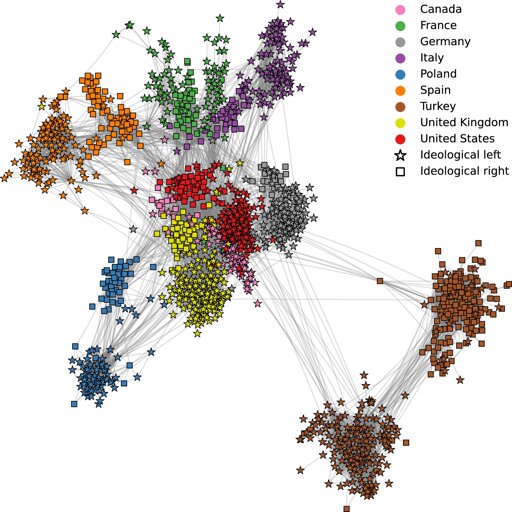Here is the link where you can read and download the study: Patterns of partisan toxicity and engagement reveal the common structure of online political communication across countries
A study suggests that political abuse is a key feature of political communication on the social media platform, “X,” and whether on the political left or right, it is just as common to see politically engaged users abusing their political opponents, to a similar degree, and with little room for moderates.
The study was published in the journal, Nature Communications.
While previous research into such online abuse has typically focused on the U.S., the current study found that abuse followed a common ally-enemy structure across the nine countries for which there was available data: Canada, France, Germany, Italy, Poland, Spain, Turkey, UK, and the U.S…
Led by City, St George’s, University of London, in collaboration with the Alan Turing Institute and others, the study suggests that individuals who deviate from their party norms are quickly treated as if they are a political enemy.
[…]
In the study, the researchers used a complete data sample of X (then called Twitter) users posts, comprising 375 million tweets over a 24-hour period in September 2022. They mapped the posts of these users to another sample of over 1,800 politicians who have an active X account.
By observing which users retweeted which politicians, the researchers were able to estimate what the political leaning of each user was, either to the left or right.
[…]
The study found that posts which mentioned political opponents were consistently more toxic than mentions of political allies. While political interactions, in general, were more toxic than non-political interactions in all the countries with available data.
While much attention has been given to social media facilitating the formation of 'echo chambers," where individuals are only exposed to similar content, this study highlights the other side: X also enables communication across political groups, but the nature of this communication is often abusive.
The type of abuse aimed at political opponents which the study analyzed is sometimes called “affective polarization,” the phenomenon where partisans have negative feelings and emotions towards members of opposing political parties.
First author of the study, Dr. Max Falkenberg, currently at the Department of Network & Data Science, Central European University, said, “Many of these trends may have worsened. Since Elon Musk’s takeover of Twitter, and the restrictions on data introduced, we no longer have access to the high quality data required to study these issues. This lack of transparency is democratically problematic and of significant concern if we are to improve the quality of political communication online.”
I wonder how many of the toxic “left” accounts in the study were ones who also happened to show a suspicious pattern of echoing Russian-friendly or not-voting-for-Democrats-friendly talking points.
Certainly natural home-grown political toxicity is, as it’s always been, a feature of anyone on the internet who’s talking about politics, right or left. But I’ve absolutely noticed on Lemmy that the same users who are incredibly toxic about their approach to anyone who disagrees with them, also tend to sometimes have other anomalous funny ideas.
the study suggests that individuals who deviate from their party norms are quickly treated as if they are a political enemy.
Is that “party” as in political party? Because I don’t know about the rest of the world, but in Canada it seems like the main polarization is between the Conservatives who have their shiny new Conservative party on one side, versus everybody else who doesn’t really have an official party they identify with all that much on the other side. It’s not yet like the USA with its seemingly-eternal two-party system. I wonder if it looks like that if you view it through Twitter.
I am not sure, but I believe that this political abuse is further reinforced by something not mentioned in the text:
- Twitter is mostly short texts, lacking situational info, subtlety, signs of doubt, etc. Those require a lot of contextual info to accurately understand, but as a piece of content is retweeted most of that context is gone.
- plenty people are not honest; they’re assumptive as a brick. They make shit up = assume = bullshit as it goes, never acknowledging “hey, I don’t actually know this, it’s just a shower thought, it might be wrong”.
- people holding minority views are more often dogpiled, and by bigger dogpiles, than people holding majority views. Kind of like the Petrie Modifier, but with worldviews instead of sex.
If I’m right this is breeding grounds for witch hunting: people don’t get why someone said something, they’re dishonest so they assume why, they bring on the pitchforks because they found a witch. And that’s bound to affect anyone voicing anything slightly off the echo chamber.
And I think that this has been going on for years; cue to “the Twitter MC of the day”. It would predate Musk, but after Musk took over he actually encouraged the witch hunts for his own political goals.
Honestly, what’s super interesting to me is how clustered the US and Germany are. I’ve always noticed that Germans show up more often than other non-native-English speaking groups in English speaking online spaces, but to see them be nearly on par with the UK in clustering with the US is wild, especially because there is so little clustering between them and the UK.




